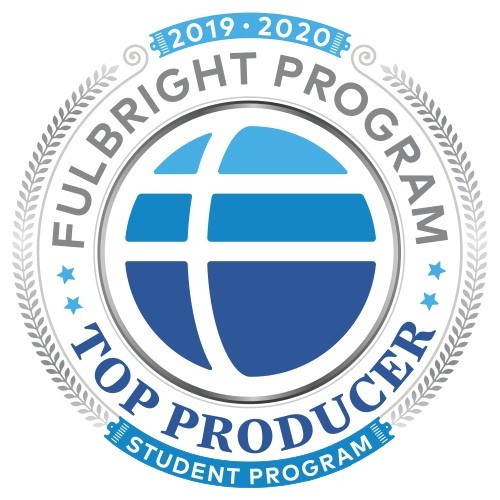The University of Iowa has again been named a top producer of Fulbright students for 2019–20 (with a record number of 19 recipients), marking the fifth consecutive year the university achieved the elite ranking. Out of 19 awards offered to UI students, 18 have accepted and become grantees.

Current students and alumni interested in applying for future Fulbright competitions should make an appointment with Fulbright Program Advisor Karen Wachsmuth to learn more about the application process.
“To receive such recognition for the fifth straight year underscores the UI’s success in training our students and faculty for prestigious work abroad,” says Russ Ganim, associate provost and dean of International Programs, which oversees the university’s Fulbright programs.
The UI is ranked 18th nationally among research universities.
More than 40% of UI applicants received awards, an extremely high number among peer U.S. research institutions. When measuring the ratio of applicants to winners, the UI is one of the best in the country, ranking sixth nationally among research universities. More than 40 faculty mentors, committee members, and staff participate in the Fulbright campus process each year.
“International exchange and study abroad can be truly life-changing,” says Montserrat Fuentes, UI executive vice president and provost. “And as the nation’s flagship international exchange program, the Fulbright offers unparalleled opportunities for our students to learn, research, teach, create, and form invaluable relationships. I am so proud of our Fulbright awardees and grateful to the staff and faculty who continue to mentor such a remarkable number of students to success through the rigorous application process.”
The 19 UI students and alumni who were awarded Fulbright U.S. Student Program grants for 2019–20 are representing the university abroad in Brazil, Cambodia, China, Colombia, Germany, Italy, Japan, Mexico, the Netherlands, Peru, Romania, Russia, Sierra Leone, South Korea, Spain, and Taiwan.
“This is more evidence that University of Iowa students are second-to-none intellectually and in their dedication to public service,” says William Reisinger, UI political science professor and 2019–20 Fulbright faculty mentor. “We are fortunate to have so many of them representing the University of Iowa and the United States through this prestigious program.”
The Fulbright competition is administered at Iowa through International Programs under the guidance of Fulbright Program Advisor Karen Wachsmuth.
“This year’s successful UI Fulbright awardees have done outstanding work during their time here studying languages, science, creative writing, education, public health, bookmaking, and a variety of other disciplines,” says Wachsmuth. “They are now abroad creating tomorrow’s international, interpersonal, and academic research networks and shaping our future by learning how people of other nations think, feel, dream, and live.”
Brenda Longfellow, UI art history professor and 2019–20 Fulbright faculty mentor, agrees: “For Fulbright award winners, the experience of forging deep personal connections with a foreign country and its people is life-changing and can lead to invaluable opportunities,” she says.
The list of colleges and universities with Fulbright recipients was published Feb. 9 in The Chronicle of Higher Education.
Looking ahead to the 2020-21 Fulbright competition, Wachsmuth says she is excited about the strong showing from the first round of applicants.
"Forty-two semi-finalists have been chosen out of the pool of 51 applicants, our largest number both of applicants and semi-finalists," she says.
The Fulbright program was created to increase mutual understanding between the people of the United States and other countries. The primary source of funding for the Fulbright Program is an annual appropriation made by the U.S. Congress to the U.S. Department of State’s Bureau of Educational and Cultural Affairs. More than 2,200 U.S. students and more than 900 U.S. college and university faculty and administrators are awarded Fulbright grants annually. In addition, some 4,000 Fulbright Foreign Students and Visiting Scholars come to the U.S. annually to study, lecture, conduct research, or teach their native language.
Since its inception in 1946, the Fulbright Program has given more than 390,000 passionate and accomplished students, scholars, teachers, artists, and professionals of all backgrounds and fields the opportunity to study, teach and conduct research, exchange ideas, and contribute to finding solutions to important international problems. The global network of “Fulbrighters” fosters mutual understanding between the United States and partner nations, advances knowledge across communities, and improves lives around the globe.